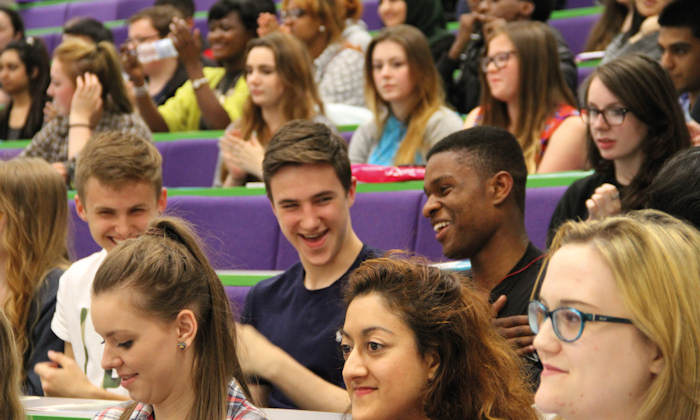A decade of mapping out futures
13 Oct 2016
Giving youngsters outstanding learning experiences – without boundaries or barriers

For ten years, Manchester Access Programme (MAP) has offered sixth-formers a ‘slice of university life’. For most, it is their first contact with a research-led University.
A two-year programme, incorporating around 50 hours of study and workshops, MAP works with Greater Manchester sixth-form students from low-participation areas: those who have experienced care provision, received free school meals, or attend state schools with a lower than average performance rate. The criteria also extend to students experiencing personal or family issues, and those whose families have never before benefited from university education.
Over the past decade, 1,344 of these youngsters have gained themselves a place at the University after completing MAP – a programme that is about preparing teenagers for undergraduate study and overcoming the obstacles that make them question their ability to study to degree level. This year, more than 1,200 applied for a place on the programme – more than double the number of places available on it.
Widening participation
Ultimately, MAP is a route into the world of graduate work for students who may never otherwise have explored it – and, for the University, it cements a commitment to social responsibility in our local community and to delivering outstanding learning experiences, without boundaries or barriers. The pupils who successfully complete it get a reduced offer, the equivalent of two A-level grades, as recognition of the time and commitment students give to MAP – and can often receive a scholarship, funded by Friends of the University, or named donors.
Mandy Crow, Student Recruitment and Widening Participation Manager, explains: “MAP helps prepare students for the transition to university and student life. The academic assignment, workshops and support through the university application process help students develop the skills and confidence to apply to a research-led university like Manchester.”
Samantha Levitt, now a University of Manchester graduate, completed MAP in 2009, and secured a scholarship place on her degree course, having been eligible as a local sixth form pupil with no immediate family who had attended university.
When MAP came into her college, it was Samantha’s first contact with anyone from a university. They explained the benefits of the programme and its opportunities. However, she wasn’t sure if MAP was for her. “I didn’t know the University was part of the Russell Group – or what the Russell Group was. I’d never spoken to anyone about going to university,” says Samantha.
Her college tutor convinced her to apply and she was surprised to find the application so straightforward.
“I had to do a statement about why I was applying. That was easy to explain – I wanted to learn.”
Spurred on by her college tutor, she applied for an English Language for Education degree. She says: “I didn’t think I was clever enough to go to university, so getting feedback from MAP made me more confident.”
Support
During her time on the programme, she received support with her UCAS personal statement. She also joined the Decision Manchester process, an initiative that guides MAP students so that they know if they will be accepted by the University before submitting their UCAS application – another factor that characterises MAP and was reassuring for Samantha. She recalls: “I knew I’d been accepted by the University; no-one else in college had that opportunity.”
A lot of MAP participants talk about feeling nervous before they venture on to campus for the first time, because they do not know what to expect. However, Samantha discovered university was not such a scary place. She says: “I didn’t expect all the support I received on MAP. I got to know the campus and how to do coursework. Other undergraduates worried a lot about this, but for me it was less daunting because of it.”
Samantha graduated in 2013 and, having volunteered as a student ambassador for the programme during her time at Manchester, she took on an internship with MAP, experiencing it from the inside. She now works in the student recruitment team at Edge Hill University, in Merseyside. She says: “I work with schools helping to prepare students for their university experience. If I hadn’t completed MAP, I wouldn’t be doing this. It’s not just about the scholarship; it’s the support you receive as well. University involves massive decisions and MAP gives you support from the first stage. You’re prepared for university, even if you don’t go to Manchester.”
